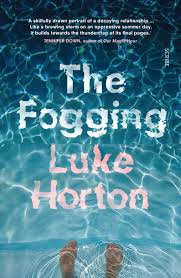I’ve read a number of books recently that are quiet and introspective, where nothing much happens and the focus is on the characters and their existential wonderings. The Fogging (Scribe 2020), by Luke Horton, is another such novel. If you enjoyed The Adversary or The Inland Sea, then The Fogging will appeal.
Told from the perspective of Tom, an anxiety-ridden, struggling, mid-thirties academic, the story is ostensibly about his holiday in Bali with his partner, Clara. After travelling frequently together when they were younger, this is their first vacation in ten years. Tom experiences a debilitating panic attack on the plane on the way over and much of the novel is given to the detailed and compelling exploration of the physical and emotional feelings and symptoms that precede and accompany his anxiety, and – ironically – his constant anxious ruminations about experiencing anxiety. This aspect seemed very authentic, as if the author writes with some insight. Once in Bali, the couple meet French woman Madeleine, her Australian partner Jeremy and their son, Ollie, and the two couples strike up a rather intense friendship.
My main criticism of this novel is the way it has been marketed. The blurb promises something of a mystery, with both the panic attacks ‘hidden from Clara’ and also ‘… when Clara and Madeleine become trapped in the maze-like grounds of the hotel during ‘the fogging’ … the atmosphere of the holiday darkens.’ Actually, the fogging is a fairly minor aspect of the book and nobody is trapped anywhere. It annoys me when the blurb depicts the book in a disingenuous way because you go into it expecting a certain kind of story. In this case, I kept thinking that ‘something else’ was going to happen, until I reached almost the end and realised that it was not building towards some imagined drama / mystery / thriller scenario.
The disappointing thing about this is that had the promo been more accurate, I would’ve gone into the book knowing what to expect. What this novel does deliver is an unsettling and disturbing examination of the unravelling of Tom and Clara’s relationship, and also Tom himself. (Although Tom and Clara never seem to really talk deeply enough to thoroughly unpack their difficulties.) The chapters are dedicated to the study of their union – every nuanced comment, every double-edged behaviour, everything said or not said, the small things they choose to do and how they choose to do them. And for Tom, also, it is an eye-opening account of anxiety and panic attacks, although certainly his experience could not be said to be a universal one. I didn’t like Tom and I found his descriptions and thoughts about Clara particularly unpleasant.
The novel is intimate and poignant, at times funny; it is a compassionate and clearly observed view of the nature of relationships and the battles that play out in the course of a long-running war; it is also a study of the battles of our own minds and psyches.
It is a novel that chronicles all the minutiae of daily living and sets them out dispassionately for the reader to interpret. I do understand that the fogging is a kind of metaphor, and I do appreciate the cruel twist at the end of the story, one that makes you want to re-read from the beginning to see what clues you missed the first time around. But I would have liked less introspection and more plot, or at least a more complex analysis or interpretation of the unravelling. As always, this is only my opinion and perhaps I’m not the target market. I’m sure that for some readers, an extraordinary exploration of the complexities of a failing relationship will be exactly the right read at the right time.

